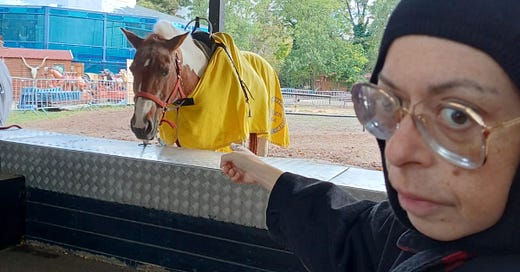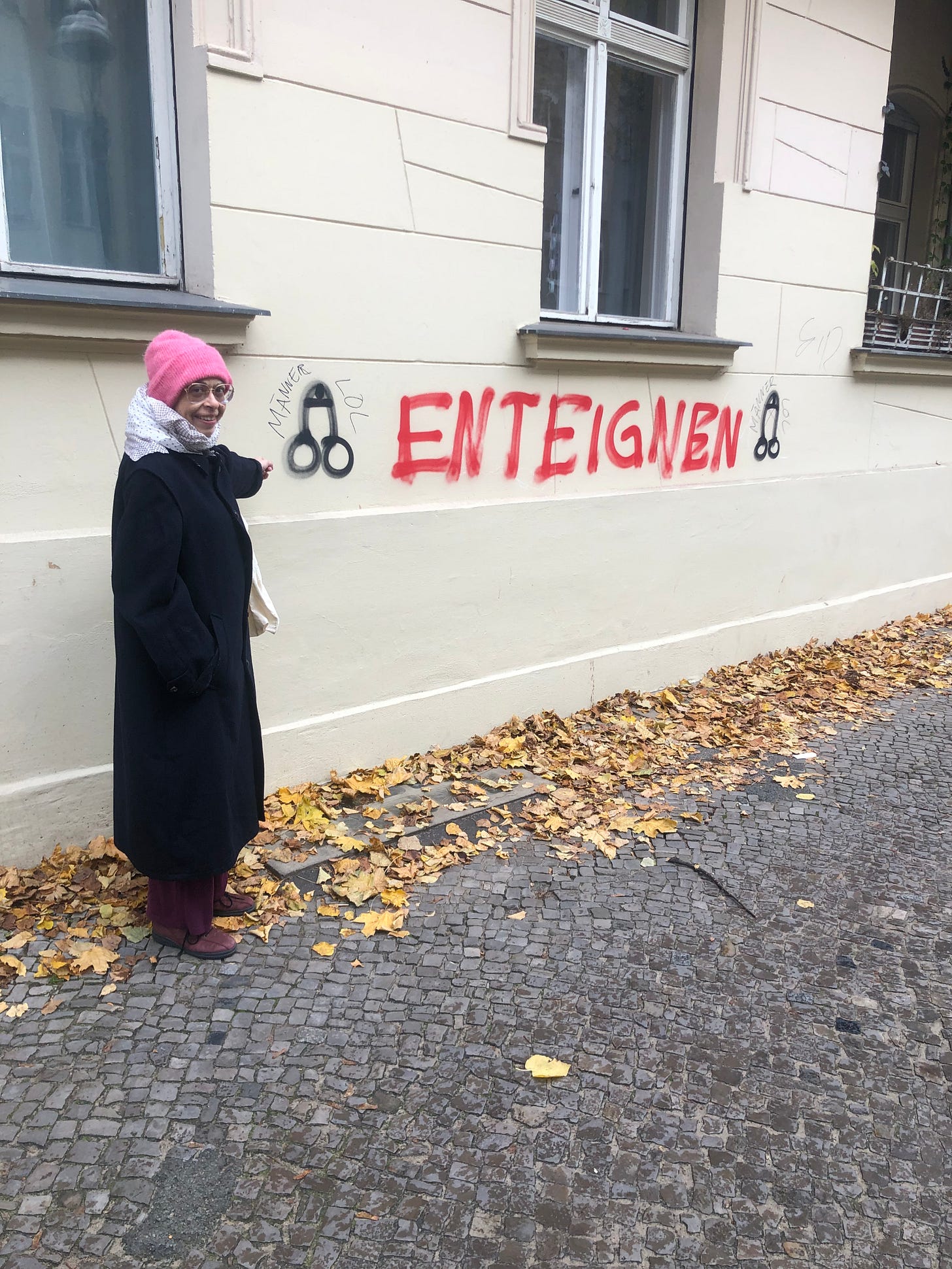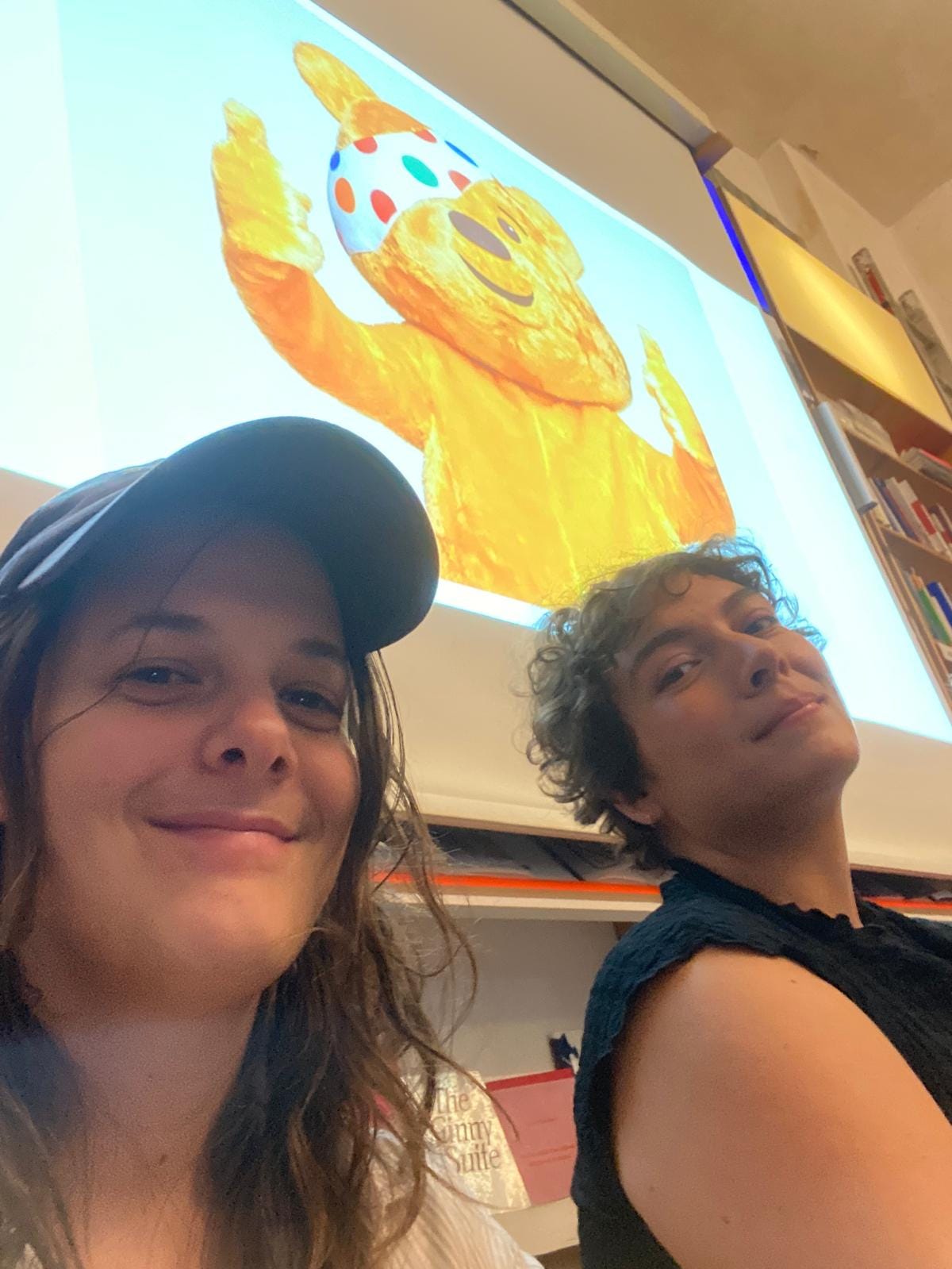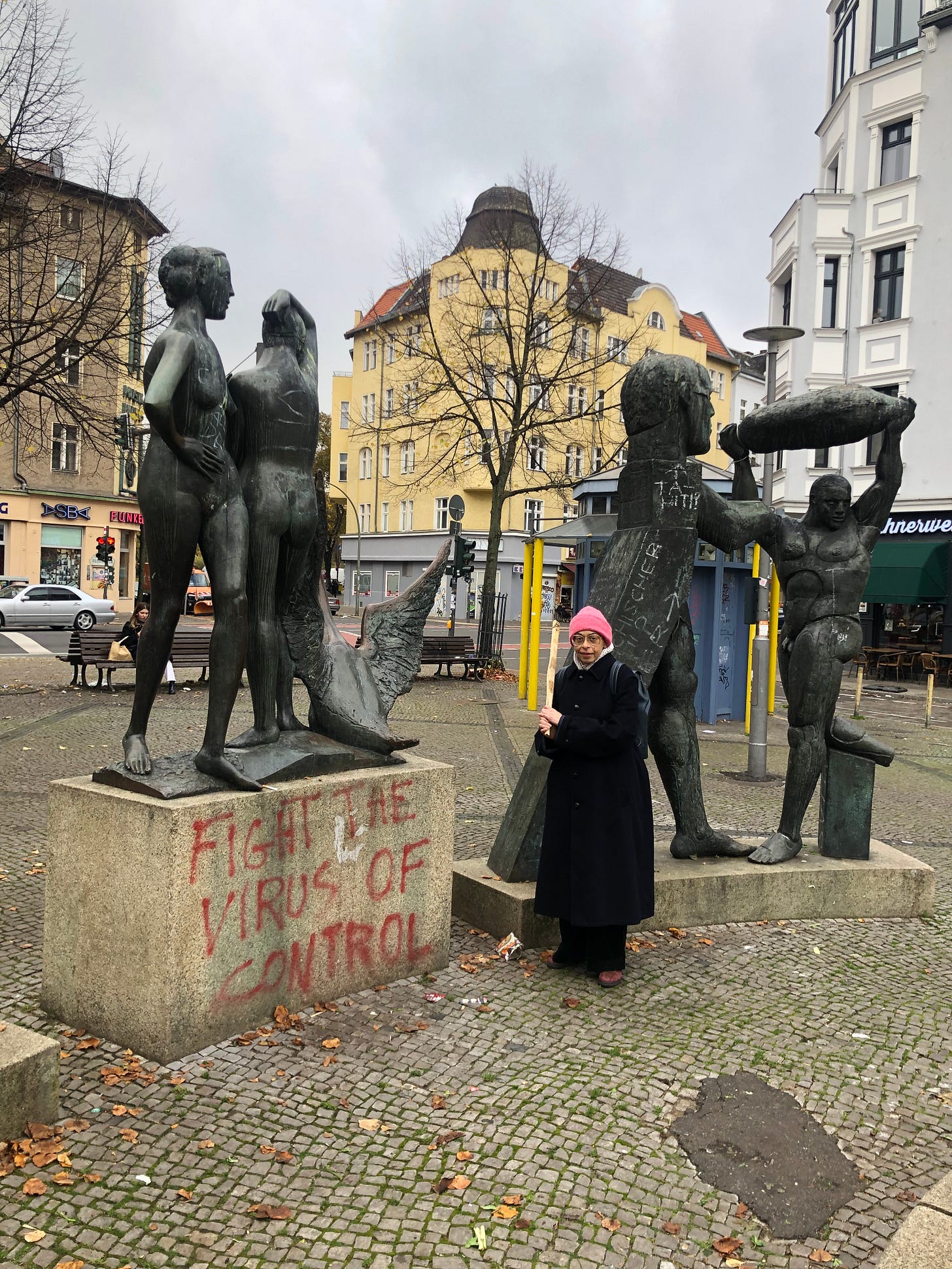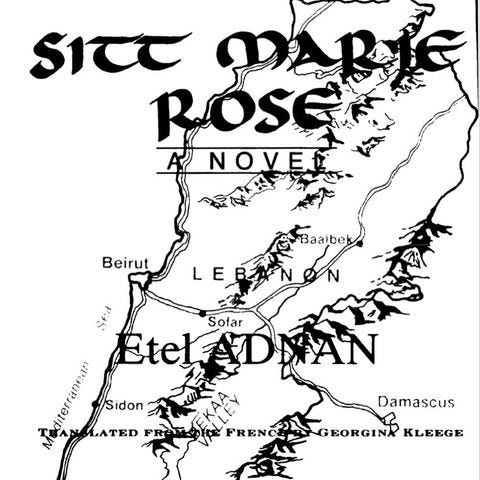Bump or Mount: An email from Danny Hayward
Earlier this summer I gave a copy of my book about Charlotte Wolff to my friend Danny Hayward as we travelled on the Overground back from a picnic on Hampstead Heath the day after Marina Vishmidt’s memorial in London. I had always planned to dedicate the book to my friends, but as the editing process was coming to an end, Marina passed away in Vienna, on the 26 April. For a long time, whenever a camera was pointed at Marina, she would point at the object nearest to her. For a while, I had a picture of her pointing at a horse at Vienna’s fairground as my phone background (picture below), after she said she would do the same with a picture of me going to a large ATM in the shape of a pig (a picture taken by Danny). When she came to visit Berlin in November 2023, I gathered a collection of photographs of her pointing at other things: at Körnerpark, some graffiti in Rixdrof that said MÄNNER LOL and ENTEIGNEN, the collection of drooping statues on Karl-Marx-Platz with the tag FIGHT THE VIRUS OF CONTROL (pictures below). And so I dedicated the book to my friends and also to Marina ‘who pointed at things / so we might / also see them’. Danny read the book quickly and sent me an email about it, perhaps one of the most generous pieces of correspondence I’ve ever received. I wanted to share it here as a tribute to the epistolary form as much as to those named in the book’s dedication: to Marina, to Danny, and everyone else for whom the dedication is capaciously intended. I include some notes and images as illustration and elaboration.
*
Sam, just finished Hand that Touch this Fortune Will, in a Cafe Nero in Angel. Thank you so much for giving me a copy. It gives me so much to think about.
Perhaps best to start with some very free associations and then go from there. Thinking about how this oppressed subculture [those whose hands Wolff reads] and its forms of cultural expression consist so often of aristocrats, déclassé artists, business people, I’m reminded of a passage from an essay Marina wrote with Zoe [Sutherland] that I read a few days ago: ‘The reality that no form of oppression cannot be alleviated by ready access to money seems to underline this overdetermination’.
I like the subtle decorative pun here: to underline an overdetermination. As a line might be drawn under a bump or a mount on the surface of a hand. Overdetermining some fatal characteristic. Fate and character... and money. I feel this insight forms a kind of background noise in your book, never intrusive or judgemental or dismissive but always there, as the register of the consciousness of a problem that is insoluble within the social relations that you are also determined to describe, to inscribe and explore. The workers appear at the end with their hands missing, never sketched in, or else misshapen or thrust deeply into their pockets. Like the character in Brecht’s early exercises in neuer Sachlichkeit with their hat pulled down over their brow. Different impulses towards concealment: the history of closeting, of hiding, of shame, with its attendant history of disguised revelation or epiphany, of which chiromancy is just one (a metonym); and the history of proletarian self-concealment, the desire not to be too conspicuous (ballys on) because the things you are made to do might not be the kind of things you would be safe to be -seen- doing. Except these two species of things (two species of ‘criminality’) are not the same, and have to be brought together disjunctively. ‘[G]ay history appears in a schema with messianic time and historical materialism’ (147).
I am still thinking through some of these questions in a very incipient way. Actually my thinking feels embarrassingly incipient -- I am always a late starter, but here it feels like I am very late, that I should have figured out some ABCs much sooner.
Because the history of concealment in queer culture also allows other things to appear than what would appear otherwise. Handreading: a form of occultism. A means of sociality and intimacy within a culture of people who cannot be quite explicit about what brings them together. Who are in any case outcasts in this world. Therefore: concealment. But also a means of disclosure, or a different -form- of disclosure. To find other means of expressing feeling, or desire, or character, than the existing society is capable of imagining, or permitting. And this is precisely because that culture -already has- its own formalised mechanisms of speech. It doesn’t need another. It is disencumbered both of the task but also of the gift of invention. So that (and here I perhaps find myself sounding more like Michel Foucault than I am accustomed to) the emergence of new forms or powers of expression, but also of interpretation, of reading, is inseparable from the experience of repression by the old ones.
So historical materialism could be an ‘archive of accumulating omissions’ (this is a heterodox theory of historical materialism) in the Brechtian sense that it is the negative space of the history that a ruling class writes about itself. And that ‘archive’ can be applied to the queer history of esoteric practices (as an alternative archive of omissions) just as the latter can be ‘applied’ to the former. And your book too is a kind of exercise in omission, in that it presents itself as a gigantic index, a book that is only its own shell, with the inside, which might be a more conventional history, or might be a more explicit account of your own motives in writing it, omitted or displaced. Is one of these terms better than the other? Perhaps ‘displaced’ is better than omitted: the idea that the absent core (the psyche that appears on the surface of the hand) is in fact not absent at all but is simply somewhere else, written on the surface of the body or implicit in its movements and gestures, just as you write at the very end of the work about the gestures that are still to come and which must be allowed to take place in the space that we leave open for them: which might be identified in the place where otherwise we would expect an explanation, in the conventional academic style.
There is something quite enigmatic in your book. You say near to the beginning that you were ultimately never quite satisfied by Wolff’s work -- that you -wanted- to be convinced -- that you -wanted- to believe in the magic. But you never quite were, you never quite did. And yet the never-quite is itself never explicitly spelled out: with the exception of the passages about racist anthropology, your own doubts remain somewhat latent. And so the reader is left to draw their own conclusions, in a system of indexical pointers and cross-references that never quite reaches ‘the’ point, that is more interested in the action of pointing than it is in points that can be scored, or accumulated.
I’m interested in this structural issue. You know that I have also been thinking about the enigmatic, or the enigma. What is a life without fate? Benjamin seems to say that it is happiness. But is it also a kind of directionlessness, or even a loss of centre, the loss of the centre of ourselves? Caye told me last week that Marina was quite a ‘decentralized’ person, and I think I know what they mean. I know that Marina herself, our pointer-in-chief, would sometimes feel that she had no centre or core. She was very interested in referential loops, in things that point at things that point back at them pointing at things that point back at them pointing etc.
There is an enigmatic line in the final coda about ‘Disturbance in the Endocrine Glands’: they were ‘obsessed with the idea of self-defence’ (199). I feel a subterranean relation here (is pointing also a form of self-defence?). But what does indexicality mean, as a practice of definition of the self in a reality that is hostile to its constitution, whether as a queer subject or a worker or as both or as none of the above? The ‘free hands’ of [Paul] Éluard are free to point at whatever they want, to point promiscuously and deceivingly, to point out realities that do not exist or relations that do not obtain [hands that hold out a spider’s web as a cat’s cradle]; and the hands that are the agent or executor of the pointing are not subjects per se but exist in a world whose own subjective qualities (a web of indexical relations) emerge through acts of pointing: which are incidentally always -away- from the self. I feel thoughts like these are an undercurrent in your book. They feel especially strong exactly in the places where it encroaches, momentarily and amusingly, on biography. The anecdotes I’ve heard you tell before: about your grandmother saying Gaylord is a queer name. These moments of failed recognition. Pudsey on TV.
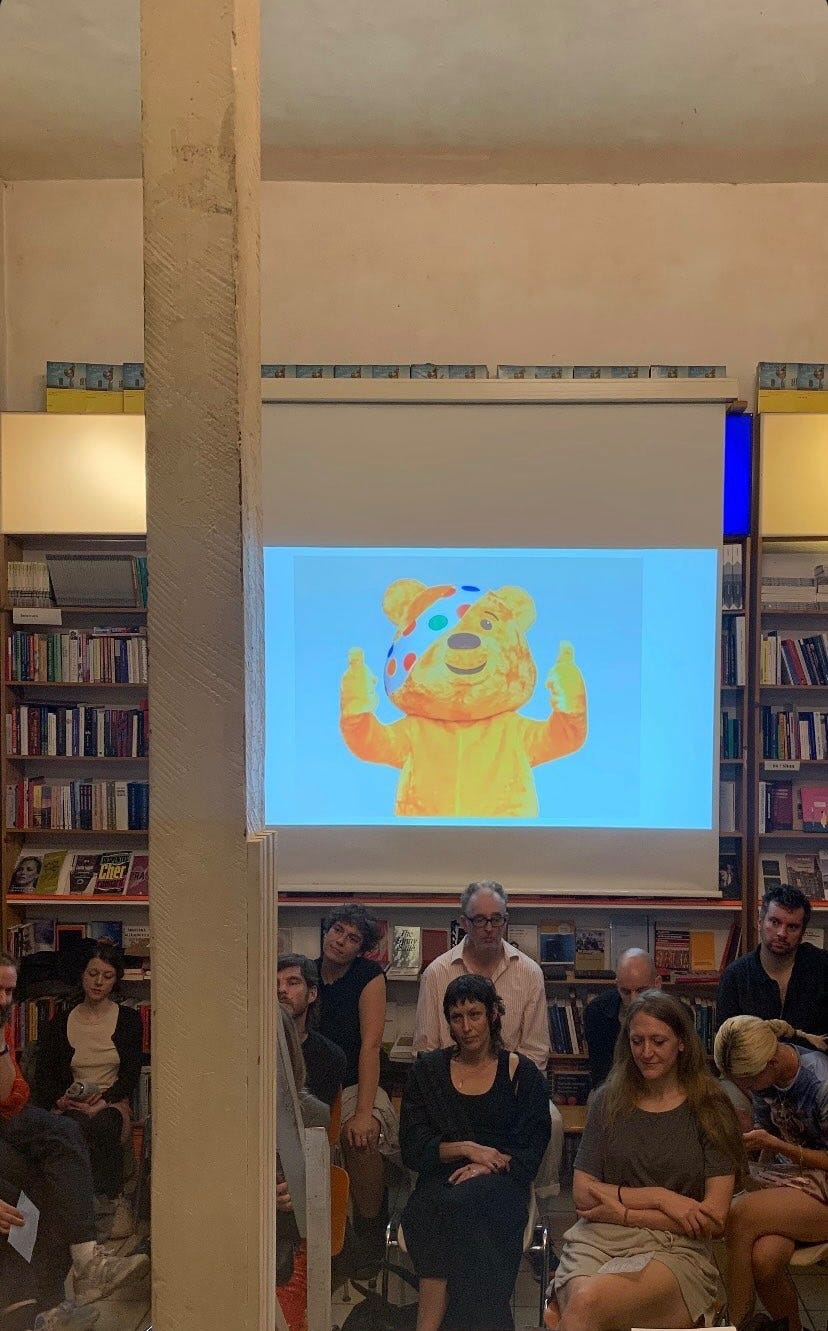
‘Hands, always on the edge of fantasy, always on the edge of incomprehension’ [194]. And perhaps also simply ‘on the edge’ of the self in itself? That is, at the point (‘pointing’) where the self ceases to be the self and instead ‘refers’ to what is not it, and in so doing becomes itself. This sounds too speciously like a rehearsal of subject-object dialectics. I don’t mean it to be. Perhaps one question I am working towards here is about ‘historical materialism’ again. Historical materialism as disclosure of what was concealed, mystified, obfuscated: but what would it mean to discuss a historical materialist approach to concealment, rather than a historical materialist means of overcoming it? Is this one thing that your book aspires to be?
A big, idle question. My mind turns to the concept of ‘outing’, which comes up I think twice in the book, in the family setting. A concept that should obviously be abolished, but which could only be abolished along with a whole system of presuppositions that make it inevitable.
Another thing I have been thinking about is... Wyndham Lewis. I remember reading Men Without Art [1934], which is a loud satirical polemic against various kinds of liberal Romanticism, which Lewis conflates with ‘inwardness’. He advocates instead for an aggressively objective if hypertrophied depiction of the physical outside. He isn’t so far from neue Sachlichkeit, in this respect, perhaps. But the difference between Lewis and Wolff has to do with what the interpretation of the outside -does-. For Lewis, the outside is the guarantor of objective reference; it reveals character and fate through a mercilessly surgical representational practice carried out upon the human anatomy. It is the opposite of the Alexander technique (touching, awareness) [Wolff read F. Matthias Alexander’s hand, which appears in the book].
It also has very little to do with the ‘conflicted symbiosis between “biology and fiction”’ that you assign to Wolff as an aim, or ambition. Which makes me ask a question about the fiction element. What if it is not true? Which is a sentence whose meaning is itself determined (or overdetermined) by the distribution of emphasis. WHAT IF it is not true? [SO] WHAT if it is not true? Is it wrong to invent things? Is fictionality necessarily a political crime? According to whose system of values? The ability to imagine is also the ability to lie. I think of a passage in Deleuze’s Repetition and Difference that I read yesterday:
Precisely their [neuropaths’ and psychopaths’] suffering, their pathos, is the only response to a question which in itself is endlessly shifted, to a problem which in itself is endlessly disguised. It is not what they say or what they think but their life which is exemplary, and is larger than they are. They bear witness to that transcendence, and to the most extraordinary play of the true and the false which occurs not at the level of answers and solutions but at the level of the problems themselves, in the questions themselves -- in other words, in conditions under which the false becomes the mode of exploration of the true, the very space of its essential disguises or its fundamental displacements: the pseudos here becomes the pathos of the True. (109)
You leave the question of the truth -- or even the question of the basis for the various interpretations -- of Wolff’s system hanging in the air, so that all there is to do is to pursue the question of the internal relations of the judgements that she makes: their indexical interrelations at the edge of the body in the form of the hands, where the true and false are an extraordinary play of invention and deception and the false becomes the mode of exploration of the true; which is perhaps something, a state of affairs, too deeply rooted in us for the word ‘fiction’ to allow us any meaningful access to it. Or so it seems to me. Pointing is also a way of moving constantly outwards, in ever-widening concentric circles, instead of hunting exhaustively for an absent centre or grail. The best book about the failure of that second way of being that I have recently read is Sitt Marie Rose [1978] by Etel Adnan. Marina was also a thinker of ever-widening concentric circles, and it is in the spirit of that type of indexicality, which is also a way of being with people, that I want to try to continue to live.
Lots of other questions and thoughts but I need to […]. There are so many things in your book, so this is just an attempt to scramble together some preliminary record of it in my already scrambled consciousness. So grateful to read it.
Love,
D.
*
At the two events I’ve done about the book, I’ve played Mary Margaret O’Hara’s song ‘Body’s in Trouble’ at the start – and so I leave it with you here now. Also to say you can get my book at MISS READ this weekend if you are in Berlin, you can still buy it online here, and it’s also in some shops including San Serriffe in Amsterdam. If you’d like to order it to your local bookshop they can do so through ART DATA.
